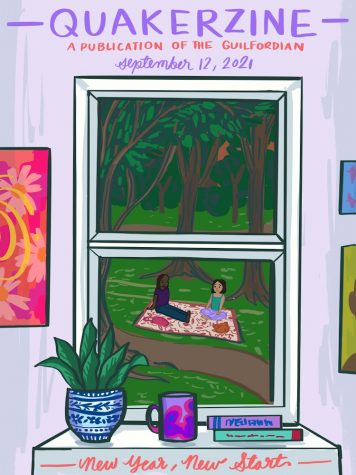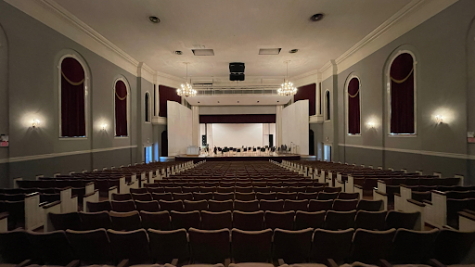Untangling first-year feelings
Walking up the chalk-stained brick walkway to Founders Hall on a hot August afternoon, you could clearly see the changes to Guilford College’s campus as the academic year started with three-week courses on Aug. 18. The Founders lobby had been transformed into a makeshift COVID-19 testing clinic. Hand sanitizer dispensers and temperature scanners had been installed at the entrance of the building. The faces of students and faculty were concealed behind masks. The pandemic has changed the landscape of higher education as well as the college experience, especially for first-year students.
Many of these first-year students have been learning virtually for the past two years, so this year consisted of compounded transitions. The first of these transitions was a monumental shift from high school to college. The increase of class rigor and social interactions, as well as changes in schedules and lifestyles, are apparent. While these changes can bring much anxiety, they can also bring tremendous excitement.
First-year student Samantha Beaumonte was asked what aspect of her first year in college she was excited about.
“I’m kind of excited for the classes, and the feel of college. It’s very different than high school, I think.” Beaumonte said. “I remember (having) smaller classes than my high school (had), which made it easier for me.”
Others are more enthusiastic about exploring the diverse amenities and extracurriculars available on campus, such as using the gym, joining choir, and visiting Cline Observatory. Mia McPherson, a first-year biology major, said she wants to visit the planetarium and use telescopes.
Her group project partner Christa Freeman, working beside her, said: “I’m excited for my theater class. I love theater.”
Students also shared their struggles to reach out and form connections with their peers.
“Nobody’s as open as I thought they would be,” said Freeman, who plans to major in business. “It’s not a lot of people that are like ‘oh, I need to make a bunch of friends’ or something.”
McPherson expressed a similar sentiment. “If you don’t play sports then….” she trailed off.
“You’re gonna be outcasted,” health science major Nariah Deberry finished.
McPherson nods. “Yeah, you’re out of place.”
This group of first-years acknowledged that they had time to connect with people since it was only the second week of the school year. Still, their frustrations in seeing the lack of outreach could be felt, as they compared the experience with social clustering to being in high school.
Additionally, the transition from learning in an online space to physical classrooms is a major adjustment that looms over this year. On top of the normal transition into college life, modes of instruction had been virtual for most current first-year students during their last year of high school.
Regarding classes, Beaumonte admitted that she works better face-to-face than she does online. “It’s… harder to continue doing it (online) because it’s so… repetitive,” Beaumonte said.
Computing Technology and Information Systems major Tanner Haithcock agreed that he would like to stay on campus as opposed to having classes online. He revealed that his time with virtual learning had not been fruitful due to the lack of proper instruction from his teacher.
Haithcock is not alone. Everyone interviewed, including Freeman and Deberry, was worried about having to transition back online because most of them had an unstructured learning experience as well. Yet, they still had concerns about being on campus.
“I don’t want to get COVID, but a lot of people don’t want to wear the masks all the time, and we’re in close proximity, like 24/7.” McPherson said. “Even with our roommate, we don’t know where they’ve been all day.”
Despite these worries, students like Beaumonte feel that Guilford College is doing a good job with its handling of COVID protocols. In keeping up with restrictions and providing people with the resources to get regularly tested for COVID-19, Beaumonte feels that students’ safety is being properly ensured.
Regardless, these first-year students are still hopeful that they can finish off the year somewhat “normally.” They have received some opportunities that they did not expect to gain, along with the things they wish to have received. Beaumonte said she is grateful everything didn’t just close down. She enjoys still being involved in activities and going to games, as do many other students. The class of 2025, along with everyone else, is learning to adjust to the unexpected.







